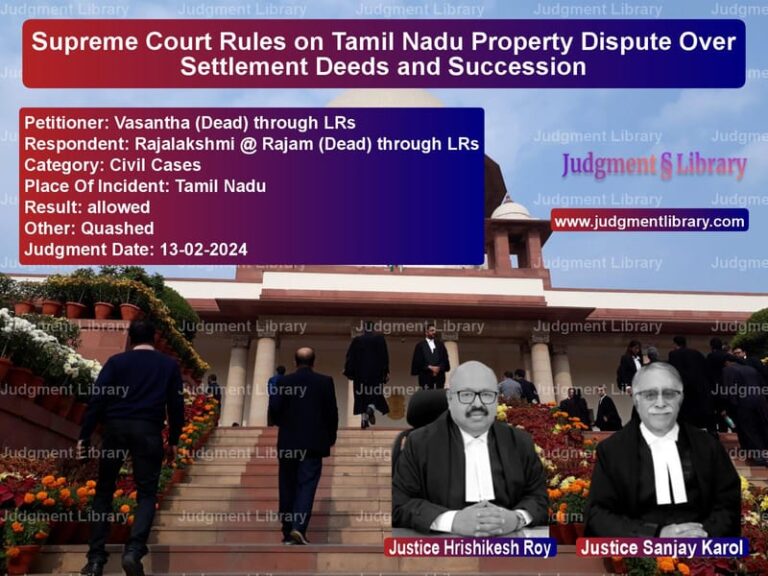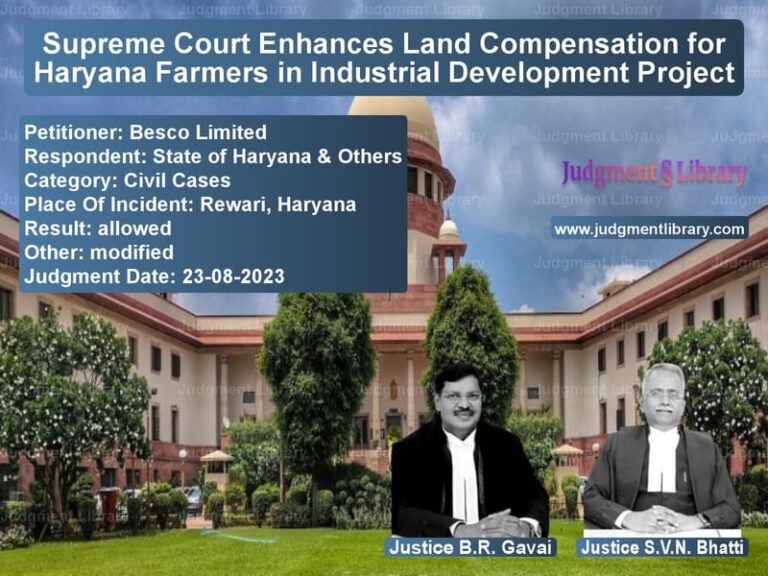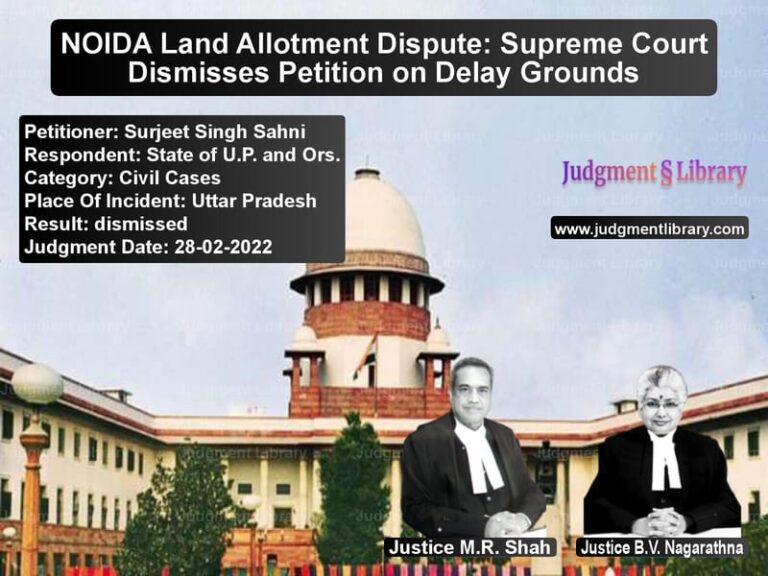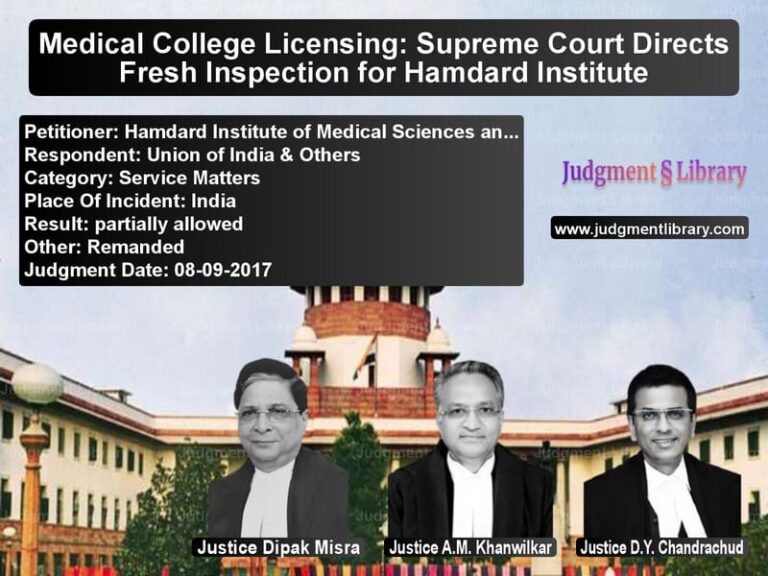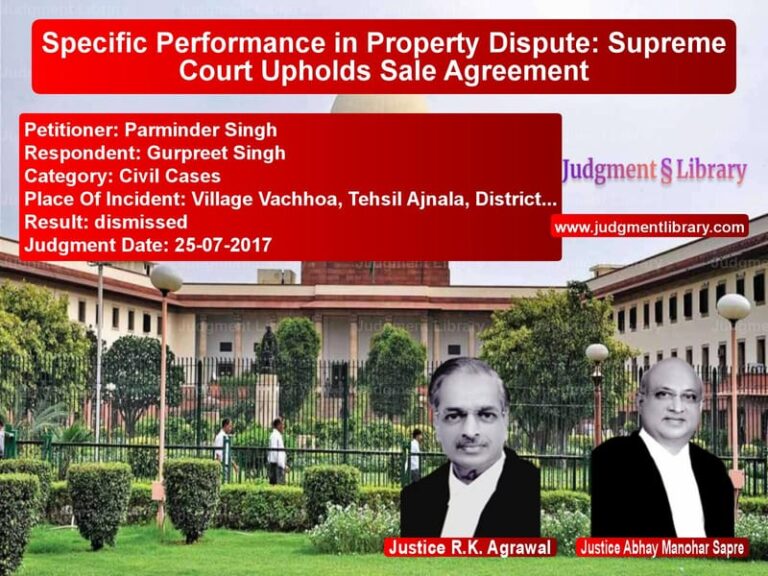Attempt to Murder Charge Reinstated: Supreme Court’s Ruling in Shoyeb Raja vs. State of Madhya Pradesh
The Supreme Court of India in Shoyeb Raja vs. State of Madhya Pradesh addressed a significant legal issue related to the applicability of Section 307 of the Indian Penal Code (IPC) in cases where the intent to kill is questioned. This case highlights the importance of judicial scrutiny in criminal trials, particularly in assessing whether an attempt to murder charge should be framed based on available medical and circumstantial evidence.
The case arose from an assault on Shoyeb Raja, who was the Chairman of the District Waqf Board, Seoni. Following a dispute over the management of a mosque committee, Raja was allegedly assaulted, resulting in his hospitalization. The legal journey spanned multiple levels of the judiciary, with the Sessions Court and the Madhya Pradesh High Court declining to frame Section 307 IPC (attempt to murder) charges against the accused. However, the Supreme Court reversed this decision, emphasizing the need for a thorough trial based on prima facie evidence.
Background of the Case
The case stemmed from an incident on March 9, 2018, when the complainant, Shoyeb Raja, was allegedly assaulted by multiple individuals due to a dispute between the newly appointed mosque committee and the previous one. The complainant was:
Read also: https://judgmentlibrary.com/supreme-court-upholds-life-imprisonment-for-murder-conviction-in-punjab/
- Physically assaulted to the point of unconsciousness.
- Taken to a district hospital and later transferred to Asian Hospital, Nagpur for further treatment.
- Allegedly subjected to throttling (pressing of the mouth, nose, and throat), which could have led to respiratory arrest.
An FIR (No. 133 of 2018) was lodged against the accused under Sections 294, 323, 506 read with 34 IPC. During the investigation, charges under Section 307 IPC were also considered but were later dropped by the lower courts.
Trial Court Proceedings
On March 18, 2019, the Judicial Magistrate First Class, Seoni, committed the case to the Additional Sessions Judge. The accused, initially on bail, were taken into custody under Section 307 IPC.
However, upon framing of charges on September 17, 2019, the defense challenged the inclusion of Section 307 IPC before the Madhya Pradesh High Court, citing lack of medical evidence supporting the claim that the injuries were life-threatening.
Read also: https://judgmentlibrary.com/custodial-death-and-police-brutality-supreme-courts-critical-ruling/
High Court Ruling and Acquittal
The Madhya Pradesh High Court, in its order dated November 23, 2023, confirmed the Sessions Court’s decision to drop the charge under Section 307 IPC. The High Court relied on the medical report, which stated that while bruises and abrasions were present, they were not described in detail regarding their size or severity.
Key observations from the High Court’s ruling:
- The medical report only suggested a possibility of respiratory obstruction due to throttling but did not confirm life-threatening injuries.
- The injuries were deemed “general and superficial.”
- Since the act of pressing the complainant’s throat did not conclusively indicate an attempt to kill, Section 307 IPC was not applicable.
Arguments Before the Supreme Court
The complainant, Shoyeb Raja, challenged the High Court’s order in the Supreme Court, arguing that:
- The nature of the injuries did not rule out an attempt to murder charge.
- The act of throttling (pressing the mouth, nose, and throat) indicated an intent to kill.
- The medical report suggested that respiratory arrest could have occurred, making the accused liable under Section 307 IPC.
- The High Court and Sessions Court erred in interpreting the severity of injuries instead of focusing on the intent and actions of the accused.
Supreme Court’s Judgment and Key Observations
The Supreme Court, comprising Justice Sanjay Karol and Justice C.T. Ravikumar, overturned the lower court rulings and reinstated the charge under Section 307 IPC. The Court emphasized:
- “Even if injuries are simple, an attempt to murder charge can be framed if the intent to cause death is evident from the accused’s actions.”
- “The medical report confirms bruises and the possibility of respiratory arrest, making it inappropriate to dismiss the charge without full trial.”
- “Intent is inferred from actions, and in this case, throttling strongly suggests an intention to harm fatally.”
Referring to precedents, the Court cited State of Maharashtra v. Kashirao (2003) and Om Prakash v. State of Punjab (1961), reaffirming that the extent of injuries is not the sole criterion for framing an attempt to murder charge. Instead, the intention and circumstances must be analyzed.
Final Order by the Supreme Court
The Supreme Court set aside the High Court’s judgment and ruled:
- The Sessions Court must reinstate the charge under Section 307 IPC.
- The trial should proceed on its own merits, uninfluenced by the observations of the High Court.
- The accused should stand trial for all the offenses, including attempt to murder.
- The judgment was forwarded to the Madhya Pradesh High Court for further action.
Key Takeaways from the Judgment
- Section 307 IPC applies even when injuries are not severe, as long as intent to kill can be inferred.
- Medical reports should be considered in conjunction with circumstantial evidence.
- Lower courts should not dismiss serious charges prematurely when there is prima facie evidence.
- Judicial review ensures that procedural lapses do not result in miscarriage of justice.
Conclusion
The Supreme Court’s decision in Shoyeb Raja vs. State of Madhya Pradesh reinforces the principle that criminal charges, particularly under Section 307 IPC, should not be dismissed merely due to the absence of grave injuries. The ruling ensures that the accused will face trial under all relevant charges, upholding the complainant’s right to a fair legal process.
Petitioner Name: Shoyeb Raja.Respondent Name: State of Madhya Pradesh & Others.Judgment By: Justice Sanjay Karol, Justice C.T. Ravikumar.Place Of Incident: Seoni, Madhya Pradesh.Judgment Date: 25-09-2024.
Don’t miss out on the full details! Download the complete judgment in PDF format below and gain valuable insights instantly!
Download Judgment: shoyeb-raja-vs-state-of-madhya-prad-supreme-court-of-india-judgment-dated-25-09-2024.pdf
Directly Download Judgment: Directly download this Judgment
See all petitions in Attempt to Murder Cases
See all petitions in Bail and Anticipatory Bail
See all petitions in Judgment by Sanjay Karol
See all petitions in Judgment by C.T. Ravikumar
See all petitions in allowed
See all petitions in Remanded
See all petitions in supreme court of India judgments September 2024
See all petitions in 2024 judgments
See all posts in Criminal Cases Category
See all allowed petitions in Criminal Cases Category
See all Dismissed petitions in Criminal Cases Category
See all partially allowed petitions in Criminal Cases Category


